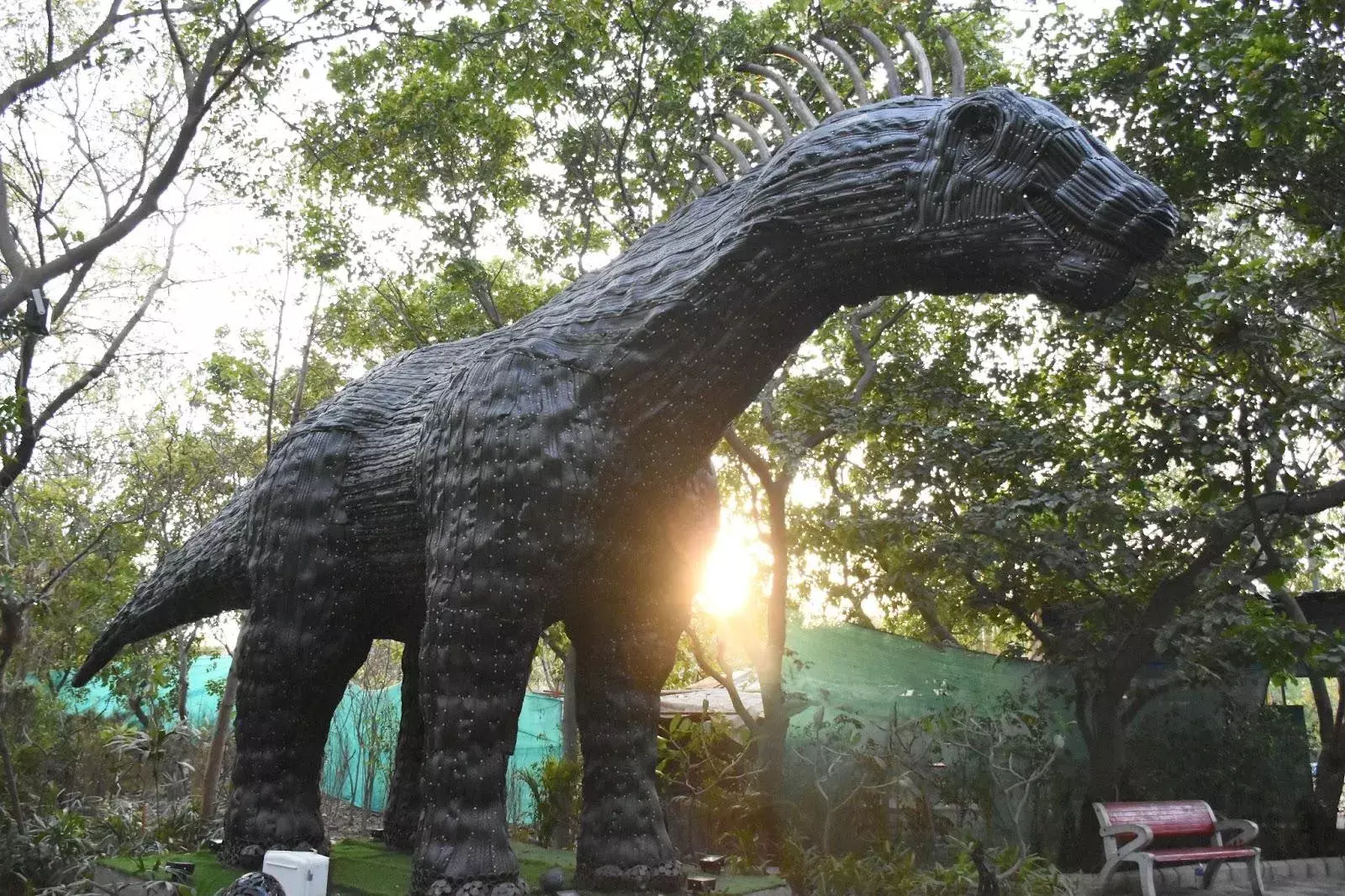Jurassic Park to the Seven Wonders: A New MCD Park for Kids
The park is made of 300 tonnes of upcycled waste

The dinosaur slowly moves its colourful head like a robot, emitting a shrieking roar from its neck adorned with rusted nets of abandoned metals. The children inside wave to their parents through circular windows made of dumped wheel rims. Vikram Singh, 33 years old, waits at the end of the metal slide, for his four-year-old son to whoosh down. When his son comes merrily down the slide, he says, “Let’s have another slide. I’ll come with you.”
Last January, the Municipal Corporation of Delhi opened one of the first waste-to-art parks at Sarai Kale Khan. The park features over 40 dinosaur replicas, statues of different animals, amphitheatres, rest stops, bridges, and various rides and slides, all built from different kinds of waste materials. The Dinosaur Park, which spans over 3.5 acres, is the second phase of the Waste to Wonder project. The first phase was focused on waste replicas of the Seven Wonders of the World, which garnered a lot of attention.
Amidst the laughter and cries of children, the roars of different kinds of dinosaurs permeate the air, as if we were in Jurassic Park. Dumped cars and abandoned vehicles have creatively been used to recreate scenes from the Jurassic movies in a more tangible, interactive manner.
The dinosaur heads are built with intricate designs, framed with various metallic wastes like cogwheels and corrugated tin. Many of the metallic waste items used were rusty, but anti-rust enamel was applied to keep them intact and clean and to prevent further decay. Polished metal has been used to create contrast rather than using colour in many places.
The waste materials include various discarded auto parts collected from the city’s landfills. Safety and structural quality have been ensured throughout the park, with hundreds of suspenders repurposed from vehicles being used to support giant structures on the ground.
Besides metal, many other forms of waste have been used to build the structures. A huge number of waste tires were upcycled to create a giant rubber dinosaur, and except for the nuts and holders, almost everything is made from tires of different vehicles, including bicycles. Steps in the paths through the park are also built from wasted tires stuffed with soil, offering a light adventure for kids hopping from one to the other.
Together with dinosaurs, the park also includes replicas of different animals and birds, most of them made from construction waste including iron rods and wires. It cost around 14 crore Rs to upcycle such a huge amount of waste.
The MCD made minimal tweaks to the waste materials. In one of the dinosaurs, they installed an Ambassador car as a dinosaur torso, and people of all ages can be seen climbing the structure and enjoying the ride in the air.
From the minutely observed details to the maximum use of waste, the park reflects in all sections. Even the washroom of the complex is made of an old shipping container, with solar panels to minimise energy consumption. The entire compound lights up with energy generated from windmills and solar panels installed within.
“This is our first waste-to-art theme park meant for children,” says a senior official of the MCD, declining to be named. “My son enjoys every ride here, but he is a little scared of the Dinosaur ride,” says Vikram. “There’s not enough space for playing in the city; kids come here to play and it helps them socialise as well.”
A small walk through this park conveys different messages for the future. It’s a place where we can see a black Taj Mahal as harbinger of the darker side of waste, as well as the Gabriel / Jibreel of a sustainable future. An Eiffel Tower still speaks of the heights that waste can reach, while the Colosseum stands as a broken monument patched with hope. The Statue of Liberty raises its torch made from trash, and the Statue of Christ spreads its arms screwed with rusty nuts and bolts.


